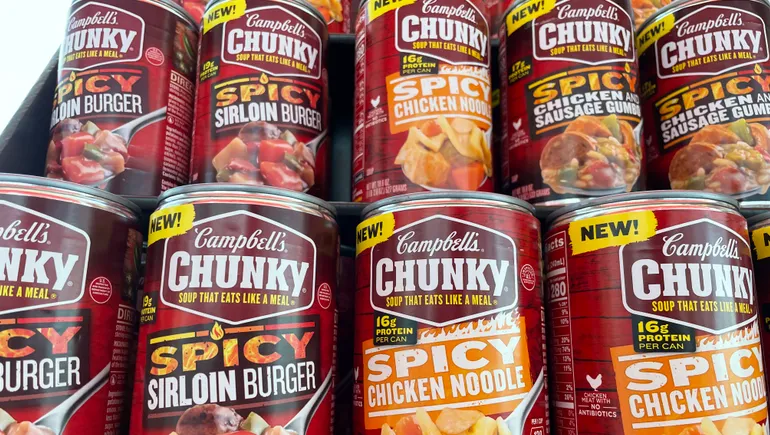Campbell Soup closing “inefficient sites” with 415 workers impacted

Dive Brief:
- Campbell Soup said it is closing one plant and reducing the size of a second facility. It’s also investing $230 million through fiscal 2026 in newer, more efficient plants as it aims to improve the competitiveness of its supply chain.
- The soup and snacks maker is shuttering its Tualatin, Oregon, location where it makes Pacific’s organic soup, broth and plant-based beverages. The closure will happen in phases, with the plant ceasing operations by July 2026. Campbell said 330 workers will be impacted. The packaged food company also plans to focus production at its Jeffersonville, Indiana, plant on Late July tortilla chips and move kettle potato chip production to other facilities. The change will affect 85 positions.
- In addition, the company said it will make investments in its Maxton, North Carolina; Hanover, Pennsylvania, and Franklin, Wisconsin plants. The changes will create a total of 210 new roles. Campbell also plans to increase production of its Goldfish crackers in Richmond, Utah, by 50% by the end of 2024. This will create 80 new roles at the site.
Dive Insight:
As companies look to overhaul their supply chains to boost efficiencies and increase production while cutting costs, Campbell is the latest to make sweeping changes to its network. The company said in a statement that “these actions are another significant step in transforming Campbell’s supply chain into a competitive advantage.”
“To fuel growth and transform our manufacturing and distribution network, we must invest and further strengthen our supply chain,” said Dan Poland, Campbell’s chief supply chain officer. “We will continue to make the highest quality products, with a more agile, flexible, and cost-effective manufacturing network.”
He added that Campbell continues to “evaluate optimization opportunities” to develop its “supply chain of the future.”
In its statement, Campbell provided details on the rationale behind the announcements at its plants.
The Oregon Pacific’s plant, for example, contains leased buildings of approximately 250,000 square feet. Campbell said the “aging facility and inefficient nature of the site’s configuration can no longer support the increased consumer demand and continued growth of the business.” It plans to move the plant’s soup and broth production to other thermal and aseptic plants and shift plant-based beverage production to leading co-manufacturing partners.
Campbell also said it will spend money and add jobs in North Carolina on new aseptic soup production, additional potato chip kettles in Pennslyvania and expanded capacity for tortilla chips in Wisconsin. The New Jersey company is not only looking to increase the efficiency of its plants but adding capacity for some of its most popular brands, including Late July and Goldfish.
The tiny fish-shaped cracker has drawn extra attention at Campbell as the packaged food manufacturer increases innovation and markets the $1 billion Goldfish brand to older consumers who grew up with the product.
To do that, Campbell is turning to different textures, bolder flavors and limited-time offerings. Goldfish is the fastest-growing cracker brand in the category, with dollar sales up 33% during the past three years, Campbell told Food Dive earlier this year.
Food manufacturers have been closing some facilities and opening or expanding existing plants to right-size production and improve efficiencies across their manufacturing networks. PepsiCo announced in April it is closing a Quaker Oats plant in Illinois which will result in the loss of 510 jobs, while Conagra Brands announced it would close a facility in Beaver Dam, Wisconsin, that produces its Birds Eye frozen brand. Conagra said 252 people would lose their jobs.
Source: fooddive.com

